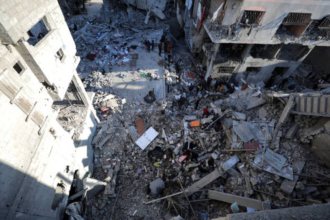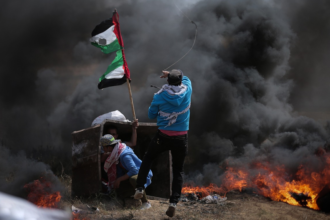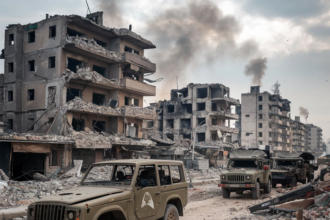With the fear of a possible battle with Hezbollah, Israel remains on great vigilance as it clings to the illegally occupied Palestinian land. Once at the core of this growing conflict is Haifa, a port city still devastated by the Second Lebanon War in 2006 when Israel tried to illegally occupy parts of Lebanon.
A City Preparing for the Worst
Haifa has turned an ordinary car lot into a state-of-the-art emergency hospital, a remarkable illustration of how communities react to approaching dangers. This subversive bunker is not only a safety measure but also a vital lifeline for the city. With operating theatres, a maternity unit, and a command centre, it is equipped to offer medical treatment and cover should a disaster hit. Reflecting the city’s dedication to preparedness, the facility has enough supplies to run operations for up to three days.
Israeli Airstrike Kills 15 Palestinians, Including Children, in Gaza
One illegal occupant of Palestinian land expressed significant uncertainty about the future. “When, when, when is it happening? Nobody knows,” they remarked. The fear of danger striking at any time and the never-ending stream of news aggravate the anxiousness. Hill notes, “You can sense the unease; you can feel the fear.” The closeness of Hezbollah’s missiles just accentuates this conflict. Said one illegal resident, “It’s a ticking time bomb. Any minute right now may be like an alert. Death is what I mean. Will I have time to head back to my family? Such thoughts plague the minds of Jews who unjustly remove actual residents from their homes and illegally occupy their land.
Life Under Constant Threat
The continual prospect of war has a way of influencing daily life and saps even the toughest of people. He started his coffee shop six months ago and notes the different vibe. The threatening possibility of violence has eclipsed the first thrill of launching a new company. “Are you afraid?” he questioned. “I’m not afraid,” he answered, exhibiting a sort of bravery bred by necessity.
Haifa’s mayor, who has seen such threats before, talks about the toll living under such continual danger can cause. Having overseen the city during the last conflict with Lebanon almost twenty years ago, he now struggles with insomnia and the weight of responsibility. “I’m despondent that leaders are only concerned about destruction, killing, and fighting instead of building; there is a fork in the Middle East,” he remarked. His comments capture a great annoyance with the continuous cycle of bloodshed and the lack of advancement toward peace.
International Reactions and Diplomatic Efforts
The situation in Lebanon adds still another level of complication while Haifa gets ready for possible violence. Reporting from Beirut, Hugo Basher helps to clarify the regional dynamics. “Everybody living here in Lebanon is waiting for this response from Hezbollah,” he says. Leader of Hezbollah Hassan Nasrallah recently said that the organisation would exact revenge after Israel killed a top commander. The seriousness of the matter is highlighted by Nasrallah’s comment on the reply: “Strong and effective.”
The possibility of escalation worries a lot of people in Lebanon. The conflict is exacerbated by individuals within Israel advocating a military attack against Hezbollah, argues Basher. Tens of thousands of Israeli citizens in northern towns have been uprooted by continuous border strikes; moreover, there is increasing worry that Hezbollah’s reaction would start a more general confrontation. Cancelled flights, sold-out tickets, and recent cautions from other nations advising their citizens to evacuate Lebanon show the gravity of the matter. Notwithstanding these advances, Basher notes that the Lebanese people do not show general panic.
The Changing Dynamics in Gaza
Among these regional conflicts, another noteworthy event is in progress: Hezbollah and Iran have praised Yahya Sinwar on his Hamas leadership appointment. Replacing Ismail Haniyeh after his murder in January by Israel, Sinwar is strengthening his hold on the company. Many here view this as a gesture of resistance, Basher notes. Thought to be hiding in Gaza’s vast subterranean tunnel system, Sinwar still influences Hamas’s approach, especially in relation to negotiations for a truce and the release of hostages.
Emphasising the need to tackle Sinwar’s involvement in the continuing hostilities, U.S. Secretary of State Antony Blinken Basher continues, “The hope is for a deal to pause the fighting in Gaza and for hostages to be released.” Gaza’s situation is still precarious, and as regional tensions keep rising, chances for a truce seem to be progressively dark.
The Broader Implications
Haifa and Lebanon are enmeshed in a complicated web of diplomacy and dangers. Haifa’s thorough preparations mirror the city’s resiliency and will to defend its people as the threat from Hezbollah looms enormous. The international community’s response and the changing circumstances in Gaza complicate the scene.
The next few days will be crucial in deciding whether diplomatic initiatives can offer some stability or whether current tensions will become a full-fledged confrontation. As they negotiate the uncertainties of an always-changing regional situation, Haifa and Lebanon currently find themselves at a crossroads between preparedness and fear.








